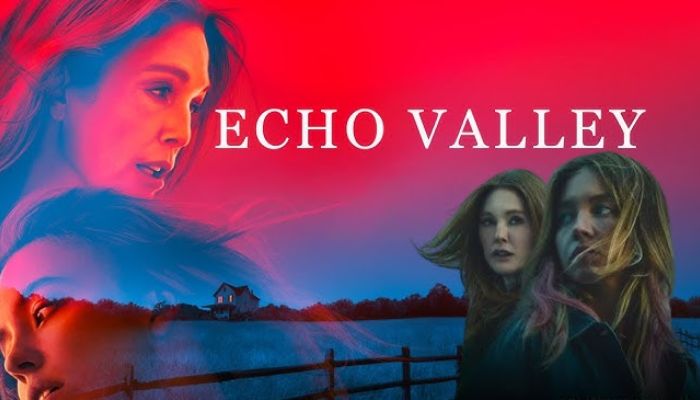
Echo Valley Review
Echo Valley (2025) Film Review, a movie directed by Michael Pearce, written by Brad Ingelsby, and starring Julianne Moore, Sydney Sweeney, and Domhnall Gleeson.
In Echo Valley, director Michael Pearce steers audiences down a quiet country lane and into an emotional ravine, delivering a slow-burning psychological thriller wrapped in the intimate fabric of a mother-daughter relationship. While not quite a horror film, it treads in similarly unsettling waters as The Babadook and Hereditary, choosing emotional claustrophobia over traditional scares. It’s a stripped-down film where the fear isn’t of what lurks outside but what’s building within.
Julianne Moore plays Kate, a resilient and reclusive woman living on a horse farm in rural Pennsylvania. Her life is one of routines and quiet grief, until her daughter Claire (Sydney Sweeney) arrives unannounced, bloodied, frantic, and hiding something dangerous. What follows is a spare and simmering descent into moral ambiguity, testing both their bond and their boundaries.
Much like Ari Aster’s Hereditary, Pearce explores generational trauma not with gore or spectacle, but with the quiet pressure of a mother-daughter relationship. Moore delivers a performance as grounded as the dirt she walks on. It’s the kind of role she’s mastered: a woman grappling with truths she’d rather ignore. There are shades of her performance in The Forgotten here; not because of any science fiction twist, but in how she holds space for grief, denial, and fury all at once. Sweeney, too, is compelling. Her Claire could easily become a stereotype, the troubled young woman, chaotic and combustible, but she manages to find vulnerability beneath abusive volatility.
Pearce keeps the direction sparse and observant. He doesn’t crowd the screen with over-stylized shots or overbearing symbolism. The cinematography lingers in long, quiet takes, allowing silences to stretch into discomfort. The sound design hums low, the score resists melodrama, and the camera stays close enough to read every twitch of hesitation on the actors’ faces.
The script, written with restraint, leaves this viewer wanting a bit more narrative closure. There are threads that feel intentionally unfinished; dialogue that hints at deeper histories without spelling them out. For some, this may register as undercooked. For others, it adds a lived-in realism: after all, most family conflict never resolves cleanly. The decision not to tie a pretty bow feels appropriately unsatisfying.
Produced by Scott Free Productions, Echo Valley is another example of the company’s shift toward psychologically driven stories that blend suspense with deeply personal stakes. For viewers not familiar with Ridley Scott’s less commercial body of work, this might seem like a departure; however, Echo Valley aligns more with Dark Skies or The Terror, where the family unit is called into question. The film carries the ghostly tone of an A24 release but with a slightly more grounded, less abstract sensibility.
For viewers drawn to the ever-evolving portrayals of mothers and daughters on screen, Echo Valley makes for a compelling double feature alongside Everything Everywhere All at Once. Both films ask: how far is a mother willing to go to do what she believes is best for her child? One, chaotic and cosmic, the other intimate and terrifying. And while Evelyn’s daughter Joy lashes out for identity and freedom, Claire’s self-destruction in Echo Valley is rooted in consequence and guilt. Both daughters are in pain. Both mothers want to help. But where one film explodes outward into color and possibility, the other implodes inward—into silence and moral rot.
Ultimately, Echo Valley is a film that festers in the quiet fears of parenthood: Is my child truly happy—and what am I willing to do to help? It trusts its actors as much as it trusts the audience, allowing the tension of unsaid words and the ache of unresolved pain to speak louder than plot. If you’re drawn to stories that treat family dynamics with the same gravity as a ticking time bomb, Echo Valley is worth the quiet descent.
Rating: 8/10
Leave your thoughts on this Echo Valley review and the film below in the comments section. Readers seeking to support this type of content can visit our Patreon Page and become one of FilmBook’s patrons.
Readers seeking more film reviews can visit our Movie Review Page, our Movie Review Twitter Page, and our Movie Review Facebook Page.
Want up-to-the-minute notifications? FilmBook staff members publish articles by Email, Mobile App, Google News, Apple News, Feedly, Twitter, Faceboo


